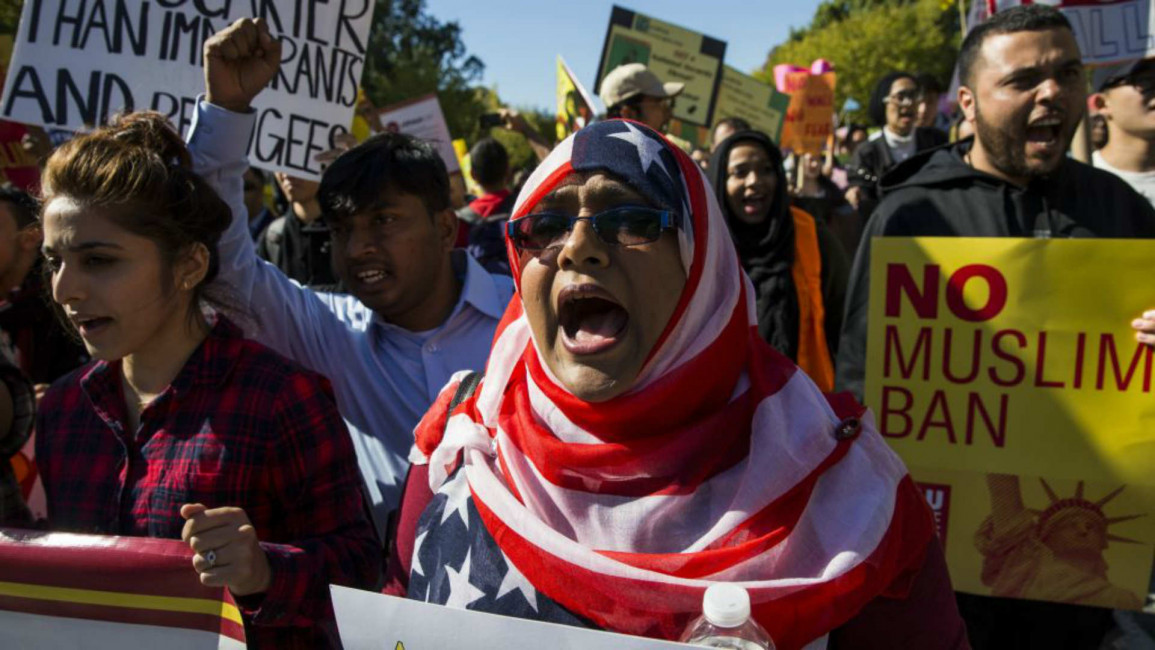
Travel ban 3.0 still doesn't conceal Trump's anti-Muslim bias
That's because Trump is as much an Islamophobe now as he was in 2016.
The legal challenges rest in large part on Trump's motives for the travel ban. Thus far, the lower courts have found the ban is motivated by a desire to decrease the number of Muslims in the US, not bona fide security interests.
In the realm of immigration and national security, courts rarely question the president's stated reasons for executive actions. But when evidence points to the real motive as offensively discriminatory, courts take a closer look.
Donald Trump's statements as candidate and president offer ample proof of his religious animus toward Muslims.
In March 2016, presidential candidate Trump expressed to a journalist his belief "I think Islam hates us... There's an unbelievable hatred of us... There is a tremendous hatred and we have to be very vigilant and we have to be very careful and we can't allow people coming into this country who have this hatred of the United States and of people who are not Muslim."
In July 2016, Trump admitted that he would reframe his ban to target "territory instead of Muslims," and by October 2016, Trump disclosed that "[t]he Muslim ban... ha[d] morphed into extreme vetting from certain areas of the world". Those certain areas are intentionally comprised of Muslim majority countries.
 |
A change in language does not reflect a change in motives |  |
Indeed, as he prepared to sign the first executive order in January 2017, President Trump stated, "This is the 'Protection of the Nation from Foreign Terrorist Entry into the United States'. We all know what that means." It means keeping Muslims from entering the US.
Opponents of the travel bans successfully persuaded the Fourth and Ninth Circuits to look behind the order's facially neutral language invoking terrorism prevention. Due to Trump's unfiltered tweeting and media interviews, it wasn't hard for judges to find he had effectively created a Muslim Ban. That it applied to seven, not all Muslim majority countries, did not make it any less discriminatory.
The courts' injunctions forced Trump to try a third time to hide his religious animus motivating the same travel ban.
 |
Trump endorses stereotypes that Muslims are violent and savage |  |
His lawyers bolstered references to national security, narrowed the ban to citizens of five Muslim majority countries, added North Korea and Venezuelan diplomats, and excluded US legal permanent residents.
Twitter Post
|
In the ongoing litigation, Trump is relying on these changes to defend the legality of the travel ban.
But a change in language does not reflect a change in motives.
Trump still believes terrorism is exclusively a Muslim problem. His anti-Muslim tweets as president show he has not had a sudden change of heart when it comes to his distrust of Muslims.
For example, on 17 August 2017, Trump tweeted after a terrorist attack in Barcelona, Spain that people should "study what Gen. Pershing of the United States did to terrorists when caught. There was no more Radical Islamic Terror for 35 years". He was referring to a false story claiming that Pershing stopped terrorism in the Philippines by shooting Muslim insurgents with bullets dipped in pigs' blood.
His message was clear: Kill, expel and bar Muslims from your country if you want to be safe.
On 29 November 2017, President Trump re-tweeted three inflammatory videos by a far-right anti-Muslim British group. To his 43 million followers, he imprinted his presidential stamp of approval for "VIDEO: Islamist mob pushes teenage boy off roof and beats him to death!"; "VIDEO: Muslim Destroys a Statue of Virgin Mary!"; and "VIDEO: Muslim migrant beats up Dutch boy on crutches!"
Again, his intent was clear. Trump endorses stereotypes that Muslims are violent and savage.
His advisors rushed to his defence claiming he was seeking to "elevate the conversation" about terrorism. And yet, Trump went out of his way to defend violent right-wing protesters in Charlottesville, Virginia.
 |
Whatever neutral language Trump's lawyers may insert into the travel ban, the motive behind Muslim Ban 3.0 still drips with anti-Muslim animus |  |
Refusing to acknowledge that American faces a serious domestic security threat from right wing groups, Trump blamed leftist groups for provoking a conflict. No such conversations take place when suspected criminals are Muslims.
Similarly, when white male mass shooters kill tens of Americans, he does not label them terrorists.
These glaring contradictions in how Trump responds to violence based on the identity of the suspect are further evidence of Trump's Islamophobic beliefs. Whatever neutral language Trump's lawyers may insert into the travel ban, the motive behind Muslim Ban 3.0 still drips with anti-Muslim animus.
The only thing holding Trump back from barring all Muslims from the US is the Constitution, not bona fide national security motives. Let's hope the Supreme Court remembers that when it conducts its merits review.
Sahar Aziz is Professor of Law and Director of the Center on Security, Race, and Rights at Rutgers Law School. She is the author of A Muslim Registry: The Precursor to Internment?
Follow her on Twitter: @saharazizlaw
Opinions expressed in this article remain those of the author and do not necessarily represent those of The New Arab, its editorial board or staff.




